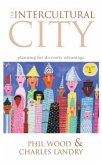Kanishka Goonewardena / Stefan Kipfer / Richard Milgrom / Christian Schmid (eds.)
Space, Difference, Everyday Life
Reading Henri Lefebvre
Herausgeber: Schmid, Christian; Kipfer, Stefan; Milgrom, Richard; Goonewardena, Kanishka
Kanishka Goonewardena / Stefan Kipfer / Richard Milgrom / Christian Schmid (eds.)
Space, Difference, Everyday Life
Reading Henri Lefebvre
Herausgeber: Schmid, Christian; Kipfer, Stefan; Milgrom, Richard; Goonewardena, Kanishka
- Broschiertes Buch
- Merkliste
- Auf die Merkliste
- Bewerten Bewerten
- Teilen
- Produkt teilen
- Produkterinnerung
- Produkterinnerung
This book merges two schools of thought - one that is political economic, and the other more culturally oriented - into a unified Lefebvrian approach to contemporary urban issues and the nature of our spatialized social structures.
Andere Kunden interessierten sich auch für
![Space, Structures and Design in a Post-Pandemic World Space, Structures and Design in a Post-Pandemic World]() Thomas FisherSpace, Structures and Design in a Post-Pandemic World40,99 €
Thomas FisherSpace, Structures and Design in a Post-Pandemic World40,99 €![Space, Gender, Knowledge: Feminist Readings Space, Gender, Knowledge: Feminist Readings]() Space, Gender, Knowledge: Feminist Readings65,99 €
Space, Gender, Knowledge: Feminist Readings65,99 €![The Intercultural City The Intercultural City]() Phil WoodThe Intercultural City49,99 €
Phil WoodThe Intercultural City49,99 €![Space, Power and the Commons Space, Power and the Commons]() Space, Power and the Commons59,99 €
Space, Power and the Commons59,99 €![The Climate Planner The Climate Planner]() Jason KingThe Climate Planner47,99 €
Jason KingThe Climate Planner47,99 €![Public Administration for Planners Public Administration for Planners]() Stephen KehsPublic Administration for Planners43,99 €
Stephen KehsPublic Administration for Planners43,99 €![Digital Participatory Planning Digital Participatory Planning]() Alexander WilsonDigital Participatory Planning44,99 €
Alexander WilsonDigital Participatory Planning44,99 €-
-
-
This book merges two schools of thought - one that is political economic, and the other more culturally oriented - into a unified Lefebvrian approach to contemporary urban issues and the nature of our spatialized social structures.
Produktdetails
- Produktdetails
- Verlag: Taylor & Francis Ltd
- Seitenzahl: 344
- Erscheinungstermin: 25. Januar 2008
- Englisch
- Abmessung: 231mm x 154mm x 22mm
- Gewicht: 508g
- ISBN-13: 9780415954600
- ISBN-10: 0415954606
- Artikelnr.: 25007449
- Verlag: Taylor & Francis Ltd
- Seitenzahl: 344
- Erscheinungstermin: 25. Januar 2008
- Englisch
- Abmessung: 231mm x 154mm x 22mm
- Gewicht: 508g
- ISBN-13: 9780415954600
- ISBN-10: 0415954606
- Artikelnr.: 25007449
Kanishka Goonewardena was trained as an architect in Sri Lanka and now teaches urban design and critical theory at the University of Toronto. He is working on two books, The Future of Planning at the "End of History" (forthcoming from Routledge) and The Urban Sensorium: Space, Ideology and the Aestheticization of Politics, exploring the making of cities, capitalism, and ideology. Stefan Kipfer teaches urbanization, urban politics, and planning in the Faculty of Environmental Studies, York University, Toronto. Informed by urban social theory, especially Henri Lefebvre, Frantz Fanon, and Antonio Gramsci, his research is focused on comparative politics, restructuring and colonization in metropolitan regions. Richard Milgrom teaches community design and urban planning processes in the Department of City Planning at the University of Manitoba. Based on his experiences as an architect and social justice activist his courses encourage direct involvement with communities. His research focuses on participatory design in culturally diverse environments. Christian Schmid is lecturer for urban sociology in the Department of Architecture ETH Zürich and senior researcher at ETH Studio Basel, Switzerland. He is the author of Stadt, Raum und Gesellschaft: Henri Lefebvre und die Produktion des Raumes, a leading work on Henri Lefebvre, as well as numerous publications on urban politics, social movements, regulation theory and urban social theory.
CONTENTS List of Figures Notes on Contributors Preface and Acknowledgements
1 On the Production of Henri Lefebvre Stefan Kipfer, Kanishka Goonewardena,
Christian Schmid and Richard Milgrom Part I: Dialectics of Space and Time 2
Towards a Three-Dimensional Dialectic: The Theory of the Production of
Space Christian Schmid 3 Space and Representation: Reading the Urban
Revolution Walter Prigge 4 Space as Concrete Abstraction: Hegel, Marx, and
Modern Urbanism in Henri Lefebvre Lukasz Stanek 5 Mondialisation before
Globalization: Lefebvre and Axelos Stuart Elden 6 Lefebvre without
Heidegger: Left Heideggerianism as contradictio in adiecto Geoffrey Waite
Part II: Rhythms of Urbanization and Everyday Life 7 Marxism and Everyday
Life: On Lefebvre, Debord and Some Others Kanishka Goonewardena 8 In Search
of the Possible: Henri Lefebvre and Everyday Life Klaus Ronneberger 9
Rhythms, Streets, Cities Kurt Meyer 10 Lessons in Surrealism:
Relationality, Event, Encounter Sara Nadal-Melsió 11 A Faustian Fusion:
Lefebvre and Debord Andy Merrifield Part III: Difference, Hegemony and The
Right to the City 12 Hegemony, Everyday Life and Difference: How Lefebvre
Urbanized Gramsci Stefan Kipfer 13 Totality, Hegemony, Difference: Henri
Lefebvre and Raymond Williams Andrew Shmuely 14 Henri Lefebvre's Critique
of State Productivism Neil Brenner 15 Right to the City: Politics of
Citizenship Liette Gilbert and Mustafa Dikeç 16 Lucien Kroll: Design,
Difference, Everyday Life Richard Milgrom 17 Globalizing Lefebvre? Stefan
Kipfer, Christian Schmid, Kanishka Goonewardena and Richard Milgrom
1 On the Production of Henri Lefebvre Stefan Kipfer, Kanishka Goonewardena,
Christian Schmid and Richard Milgrom Part I: Dialectics of Space and Time 2
Towards a Three-Dimensional Dialectic: The Theory of the Production of
Space Christian Schmid 3 Space and Representation: Reading the Urban
Revolution Walter Prigge 4 Space as Concrete Abstraction: Hegel, Marx, and
Modern Urbanism in Henri Lefebvre Lukasz Stanek 5 Mondialisation before
Globalization: Lefebvre and Axelos Stuart Elden 6 Lefebvre without
Heidegger: Left Heideggerianism as contradictio in adiecto Geoffrey Waite
Part II: Rhythms of Urbanization and Everyday Life 7 Marxism and Everyday
Life: On Lefebvre, Debord and Some Others Kanishka Goonewardena 8 In Search
of the Possible: Henri Lefebvre and Everyday Life Klaus Ronneberger 9
Rhythms, Streets, Cities Kurt Meyer 10 Lessons in Surrealism:
Relationality, Event, Encounter Sara Nadal-Melsió 11 A Faustian Fusion:
Lefebvre and Debord Andy Merrifield Part III: Difference, Hegemony and The
Right to the City 12 Hegemony, Everyday Life and Difference: How Lefebvre
Urbanized Gramsci Stefan Kipfer 13 Totality, Hegemony, Difference: Henri
Lefebvre and Raymond Williams Andrew Shmuely 14 Henri Lefebvre's Critique
of State Productivism Neil Brenner 15 Right to the City: Politics of
Citizenship Liette Gilbert and Mustafa Dikeç 16 Lucien Kroll: Design,
Difference, Everyday Life Richard Milgrom 17 Globalizing Lefebvre? Stefan
Kipfer, Christian Schmid, Kanishka Goonewardena and Richard Milgrom
CONTENTS List of Figures Notes on Contributors Preface and Acknowledgements
1 On the Production of Henri Lefebvre Stefan Kipfer, Kanishka Goonewardena,
Christian Schmid and Richard Milgrom Part I: Dialectics of Space and Time 2
Towards a Three-Dimensional Dialectic: The Theory of the Production of
Space Christian Schmid 3 Space and Representation: Reading the Urban
Revolution Walter Prigge 4 Space as Concrete Abstraction: Hegel, Marx, and
Modern Urbanism in Henri Lefebvre Lukasz Stanek 5 Mondialisation before
Globalization: Lefebvre and Axelos Stuart Elden 6 Lefebvre without
Heidegger: Left Heideggerianism as contradictio in adiecto Geoffrey Waite
Part II: Rhythms of Urbanization and Everyday Life 7 Marxism and Everyday
Life: On Lefebvre, Debord and Some Others Kanishka Goonewardena 8 In Search
of the Possible: Henri Lefebvre and Everyday Life Klaus Ronneberger 9
Rhythms, Streets, Cities Kurt Meyer 10 Lessons in Surrealism:
Relationality, Event, Encounter Sara Nadal-Melsió 11 A Faustian Fusion:
Lefebvre and Debord Andy Merrifield Part III: Difference, Hegemony and The
Right to the City 12 Hegemony, Everyday Life and Difference: How Lefebvre
Urbanized Gramsci Stefan Kipfer 13 Totality, Hegemony, Difference: Henri
Lefebvre and Raymond Williams Andrew Shmuely 14 Henri Lefebvre's Critique
of State Productivism Neil Brenner 15 Right to the City: Politics of
Citizenship Liette Gilbert and Mustafa Dikeç 16 Lucien Kroll: Design,
Difference, Everyday Life Richard Milgrom 17 Globalizing Lefebvre? Stefan
Kipfer, Christian Schmid, Kanishka Goonewardena and Richard Milgrom
1 On the Production of Henri Lefebvre Stefan Kipfer, Kanishka Goonewardena,
Christian Schmid and Richard Milgrom Part I: Dialectics of Space and Time 2
Towards a Three-Dimensional Dialectic: The Theory of the Production of
Space Christian Schmid 3 Space and Representation: Reading the Urban
Revolution Walter Prigge 4 Space as Concrete Abstraction: Hegel, Marx, and
Modern Urbanism in Henri Lefebvre Lukasz Stanek 5 Mondialisation before
Globalization: Lefebvre and Axelos Stuart Elden 6 Lefebvre without
Heidegger: Left Heideggerianism as contradictio in adiecto Geoffrey Waite
Part II: Rhythms of Urbanization and Everyday Life 7 Marxism and Everyday
Life: On Lefebvre, Debord and Some Others Kanishka Goonewardena 8 In Search
of the Possible: Henri Lefebvre and Everyday Life Klaus Ronneberger 9
Rhythms, Streets, Cities Kurt Meyer 10 Lessons in Surrealism:
Relationality, Event, Encounter Sara Nadal-Melsió 11 A Faustian Fusion:
Lefebvre and Debord Andy Merrifield Part III: Difference, Hegemony and The
Right to the City 12 Hegemony, Everyday Life and Difference: How Lefebvre
Urbanized Gramsci Stefan Kipfer 13 Totality, Hegemony, Difference: Henri
Lefebvre and Raymond Williams Andrew Shmuely 14 Henri Lefebvre's Critique
of State Productivism Neil Brenner 15 Right to the City: Politics of
Citizenship Liette Gilbert and Mustafa Dikeç 16 Lucien Kroll: Design,
Difference, Everyday Life Richard Milgrom 17 Globalizing Lefebvre? Stefan
Kipfer, Christian Schmid, Kanishka Goonewardena and Richard Milgrom








